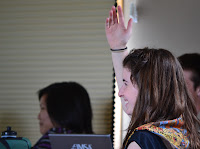Monday June 11, 2012
Contributed by Keerthana Pakanati
Today was our first real day of negotiation training at the
Keystone Center. We packed our sandwiches, ate some eggs, and were on our way.
In the morning, we started by discussing about the problems in the public
sphere, and what we could do to stop them, based on the 3 groups of
stakeholders, the government, who regulates, the advocacy groups and the
industry, both on other ends of the spectrum on many topics, including nuclear
energy, and the continued use of fossil fuels. There is a way to get to a
consensus, and that begins with setting up a frame. Usually, in a negotiation,
everyone will come out with a bit of a heart burn, something they could live
with, but had to give a little to get. While brainstorming negotiation tactics,
I was surprised to realize that manipulation, and fake deadlines were often
used, given that I thought a negotiation was always based on the truth. That
fake deadline would come back to haunt my group in the night’s activity. We
learned what it was to be a mediator, courtesy of Taladega Nights, and that a
position and an interest were two different things, a position being more
specific, and the interest being the need that lies behind the position.

We
realized what it meant to build trust, and we played a fun, but very intense
game called Rio Sucio. Basically the point of the game was to make money for
your country, and between the 5 countries that lived along the river, you could
choose to make an economic move, or resist. Now for the first couple of rounds,
there was no contact among the countries, but our strategy was to build trust
by not making economic endeavors. However, when we sent a person to negotiate,
we were stabbed in the back. However, we trucked on, and even managed to form
an alliance with one of the countries. Tensions ran high as one country refused
to back down, and chose to make an economic endeavor every time. It was a
riveting game that also taught us what trust really meant. We were introduced
to the idea of hat thinking, where six different colors, green, black, yellow,
blue, red and white each represented a different process in the steps of coming
up with an idea and figuring out the pros and cons, and how to implement it.
Not to mention we all looked very fancy in those hats during the activity.
Lastly, we received bios of the expert panel we would be meeting Tuesday and
came up with questions that we were eager to ask them, like how they came upon
their profession, or their opinion on fracking. We walked back to the science
school along a river, taking in all the beauty that was Colorado. Lastly, we
played a frustrating, stimulating, frenzy of a game, called the “puzzling”
nature of negotiation. The point of the game was to create a 100 piece puzzle
in what appeared to be an hour, but wasn’t actually. We were given money to
trade pieces, and the 6 puzzles were jumbled up into a mess of pieces. It
didn’t help that many of the puzzles had similar colors, like white fur and
blue sky. Try as we might, we weren’t able to complete the puzzle, but we did
manage to realize that negotiation and facts aren’t always as simple as they
appear. All in all, it was an informative, fun, and slightly stressful (only in
the games), Monday.






